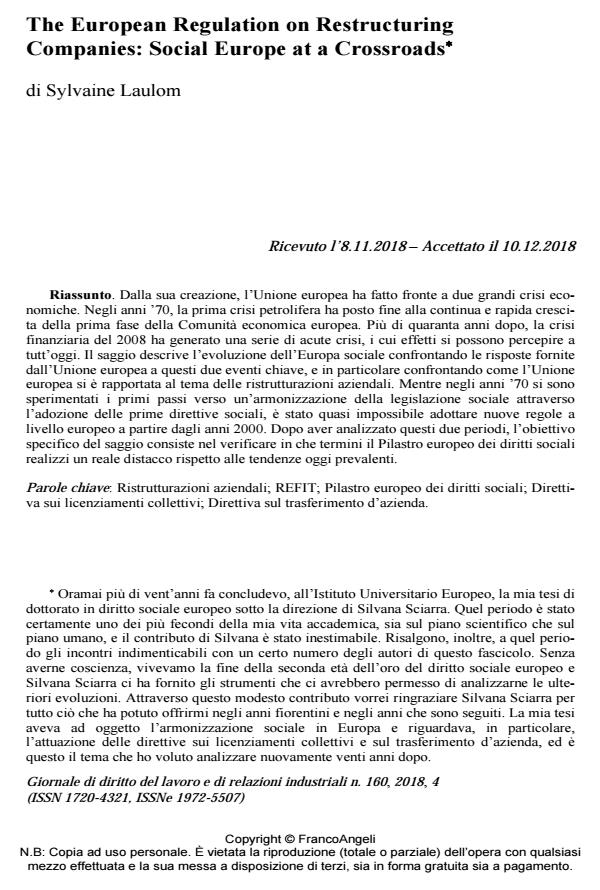The European Regulation on Restructuring Companies: Social Europe at a Crossroads
Titolo Rivista GIORNALE DI DIRITTO DEL LAVORO E DI RELAZIONI INDUSTRIALI
Autori/Curatori Sylvaine Laulom
Anno di pubblicazione 2019 Fascicolo 2018/160 Lingua Inglese
Numero pagine 31 P. 811-841 Dimensione file 317 KB
DOI 10.3280/GDL2018-160006
Il DOI è il codice a barre della proprietà intellettuale: per saperne di più
clicca qui
Qui sotto puoi vedere in anteprima la prima pagina di questo articolo.
Se questo articolo ti interessa, lo puoi acquistare (e scaricare in formato pdf) seguendo le facili indicazioni per acquistare il download credit. Acquista Download Credits per scaricare questo Articolo in formato PDF

FrancoAngeli è membro della Publishers International Linking Association, Inc (PILA)associazione indipendente e non profit per facilitare (attraverso i servizi tecnologici implementati da CrossRef.org) l’accesso degli studiosi ai contenuti digitali nelle pubblicazioni professionali e scientifiche
Since the European Union came into existence, it has faced two major economic crises. In the 1970s, the first oil crisis put an end to the continuous and fastest economic growth of the first period of the European Economic Communities. More than 40 years later, the 2008 financial crisis generated a series of acute crises, the effects of which can be felt to this day. Comparing the European Union’s social response to these two key periods, and more specifically comparing how the European Union faced the issue of company restructuring, highlights the evolution of Social Europe. While the 1970s saw the first steps towards harmonising social legislation, with the adoption of the first social directives, it has been almost impossible to adopt new rules on the European level since the 2000s. After analysing these two periods, the specific objective of this paper is to analyse whether the European Pillar of Social Rights marks a real departure from current prevailing trends.
Dalla sua creazione, l’Unione europea ha fatto fronte a due grandi crisi economiche. Negli anni ’70, la prima crisi petrolifera ha posto fine alla continua e rapida crescita della prima fase della Comunità economica europea. Più di quaranta anni dopo, la crisi finanziaria del 2008 ha generato una serie di acute crisi, i cui effetti si possono percepire a tutt’oggi. Il saggio descrive l’evoluzione dell’Europa sociale confrontando le risposte fornite dall’Unione europea a questi due eventi chiave, e in particolare confrontando come l’Unione europea si è rapportata al tema delle ristrutturazioni aziendali. Mentre negli anni ’70 si sono sperimentati i primi passi verso un’armonizzazione della legislazione sociale attraverso l’adozione delle prime direttive sociali, è stato quasi impossibile adottare nuove regole a livello europeo a partire dagli anni 2000. Dopo aver analizzato questi due periodi, l’obiettivo specifico del saggio consiste nel verificare in che termini il Pilastro europeo dei diritti sociali realizzi un reale distacco rispetto alle tendenze oggi prevalenti.
Keywords:Ristrutturazioni aziendali; REFIT; Pilastro europeo dei diritti sociali; Direttiva sui licenziamenti collettivi; Direttiva sul trasferimento d’azienda.
- Ales E. et al. (eds.) (2018). International and European Labour Law. Article-by-Article Commentary. Baden-Baden: Beck-Hart-Nomos.
- Bercusson B. (2004). The Institutional Architecture of the European Social Model. In: Tridimas T., Nebbia P., eds., European Union Law for the Twenty-First Century. Volume 2, Rethinking the New Legal Order. Oxford: Hart Publishing, 311 ss.
- Clauwaert S. (2013). The country-specific recommendations (CSRs) in the social field. Bruxelles: ETUI.
- Graber S. (2017). The Constitutional (Im)balance between “the Market” and the “the Social” in the European Union. ECLR, 13(1): 23 ss.
- Joerges C., Roedl F. (2004). Social Market Economy as Europe’s Social Model?. EUI Working Paper, Law No 2004/8.
- Laulom S. (2005). Le cadre communautaire de la représentation des travailleurs dans l’entreprise. In: Laulom S., ed., Recomposition des systèmes de représentation des salariés en Europe. Saint-Etienne: Presses Universitaires de Saint-Etienne, 23 ss.
- Laulom S. et al., eds. (2012). Quel droit social dans une Europe en crise?. Bruxelles: Larcier.
- Laulom S., ed. (2014). Which securities for workers in times of crisis. Special ed. of the ELLJ, 5(3-4).
- Laulom S., ed. (2018a). Collective Bargaining in times of crisis. Bulletin for Comparative Labour Relations n. 99. Alphen aan den Rijn: Kluwer Law International.
- Laulom S. (2018b). Better regulation and the social acquis: Is the REFIT fit for purpose?. ELLJ, 9(1): 7 ss..
- Laulom S., Sciarra S. (2018). Quel cadre juridique pour les accords transnationaux d’entreprise?. In: Aa.Vv., Le droit sans frontières. Mélanges en l’honneur d’Antoine Lyon-Caen, Paris: Dalloz, 485 ss.
- Schömann I. (2015). EU REFIT machinery “cutting red tape” at the cost of the acquis communautaire. ETUI Policy Brief, 5/2015.
- Sciarra S., ed. (2001). Labour Law in the Courts: National Judges and the European Court of Justice. Oxford: Hart Publishing.
- Sciarra S. (2013a). L’Europea e il lavoro. Solidarietà et conflitto in tempi di crisi. Roma-Bari: Laterza.
- Sciarra S. (2013b). Resocialising collective deliberations. In: Countouris N., Freedland M., eds., Resocialising Social Europe in a Time of Crisis. Cambridge: Cambridge University Press, 414 ss.
- Sciarra S. (2018). Solidarity and Conflict. European Social Law in Crisis. Cambridge: Cambridge University Press.
Sylvaine Laulom, The European Regulation on Restructuring Companies: Social Europe at a Crossroads in "GIORNALE DI DIRITTO DEL LAVORO E DI RELAZIONI INDUSTRIALI " 160/2018, pp 811-841, DOI: 10.3280/GDL2018-160006